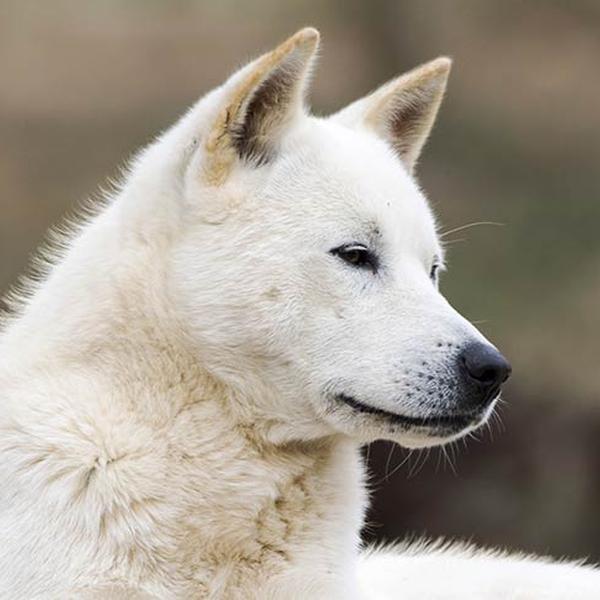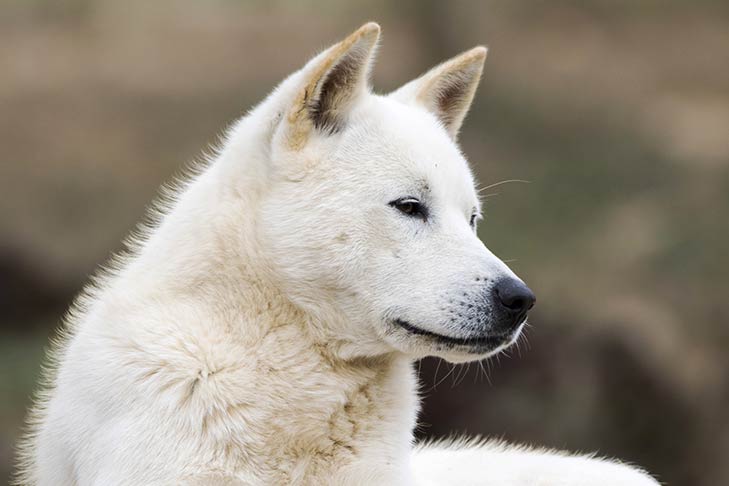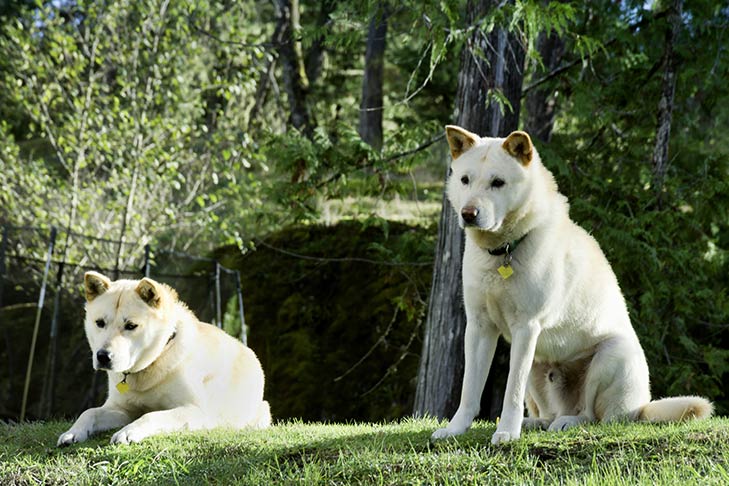Jindo
also known as Korean Jindo Dog, Jin Dog

 History
History
The Jindo is a breed of dog that originated on Jindo Island, which is located off the southwestern coast of South Korea. The breed has a long and storied history in South Korea and is considered a national treasure. It is known for its intelligence, loyalty, and strong hunting instincts, and has been used for hunting and guarding for centuries.
The Jindo is thought to have descended from the Mongolian Wolf, and it is believed that the breed was brought to Jindo Island by the Mongols during their invasions of Korea in the 13th century. The Jindo was originally used by the local villagers for hunting and guarding, and it quickly became an important part of life on the island.
In the 19th century, the Jindo began to gain recognition beyond Jindo Island, and it became a popular breed throughout South Korea. The breed was officially recognized as a national treasure in 1962 and was designated as a Natural Monument in 1984.
Despite its popularity in South Korea, the Jindo was not well known outside of the country until the late 20th century. In 1992, a group of Jindo breeders formed the Jindo Dog Association of Korea (JDAK) in order to promote and protect the breed. The JDAK worked to establish breed standards and to organize shows and other events for the Jindo.
Breed Information
Is Jindo a purebred?
Purebred
What were Jindos originally used for?
Versatile hunter
How Long Do Jindos Live? What is average life expectancy for a Jindo? How long can Jindos live?
12-15 years
The average Jindo lifespan is somewhere between 12-15 years, provided they aren't beset by any exceptional health issues or injuries.
Jindo Height & Weight
How big is a full grown Jindo?

| Height | ||||
|---|---|---|---|---|
| Average | 6 months | 12 months | 18 months | |
| Male | 20-22 inches (50.8 - 55.9 cm) | 17.0 inches (43.2 cm) | 21.0 inches (53.3 cm) | 21.0 inches (53.3 cm) |
| Female | 18-20 inches (45.7 - 50.8 cm) | 15.0 inches (38.1 cm) | 19.0 inches (48.3 cm) | 19.0 inches (48.3 cm) |
| Weight | ||||
|---|---|---|---|---|
| Average | 6 months | 12 months | 18 months | |
| Male | 40-51 pounds (18 - 23 kg) | 20.5 pounds (9 kg) | 33.0 pounds (15 kg) | 45.0 pounds (20 kg) |
| Female | 33-42 pounds (15 - 19 kg) | 18.0 pounds (8 kg) | 30.0 pounds (14 kg) | 35.0 pounds (16 kg) |
Are Jindos Hypoallergenic?
No
Unfortunately, the Jindo is not hypoallergenic, making it not a good choice for a dog lover who suffers from pet allergies.
What is the watchdog ability of a Jindo dog?
![]()
![]()
![]()
![]()
![]()
Jindos are very good watchdogs. They are a vocal breed, and are wary of outsiders, so if someone approaches your home or aims to intrude, the Jindo is going to make sure everyone knows about it.
Breed History
Where do Jindos come from?
South Korea
What are Jindos descended from?
Spitz-type
When were Jindos first bred? How old is the Jindo breed?
Unknown

Jindo Appearance
What color are Jindo eyes?
Brown
What color can Jindo nose be naturally?
Black
What color can Jindo coat be naturally?
White
Brindle
Red
Gray
Black
How long is a Jindos coat?
![]()
![]()
![]()
![]()
![]()
The coat of a Jindo dog ranges in length from short to medium.
How Dense Is The Jindo Coat?
![]()
![]()
![]()
![]()
![]()
What is the texture of the hair of a Jindo?
Straight
How many puppies can a Jindo have in a litter? How many puppies can a Jindo have in her first litter?
12-15 puppies per pregnancy
A Jindo can have a litter of 12-15 puppies on average. However, it's worth noting that the size of the litters can vary greatly. Factors that can influence litter size include the health of the mother, breeding history, and genetics.

Jindo Health Issues
What are the major health concerns to be aware of when owning a Jindo?
Hypothyroidism
What are the less significant issues to keep in mind when it comes to Jindos?
Hip Dysplasia
Elbow Dysplasia
What are the occasional tests recommended for Jindo breed?
Hip X-Rays
Thyroid Tests

Jindo Needs and Activities
Do Jindos have a lot of energy?
![]()
![]()
![]()
![]()
![]()
Jindos are known for their high energy levels, so if you're looking for a more low-key dog, this breed may not be the best choice.
How much exercise should Jindos get?
![]()
![]()
![]()
![]()
![]()
The Jindo dog needs significant physical activity to maintain a healthy lifestyle. They are also well-suited for those who lead an active lifestyle and enjoy activities such as running, hiking, or other outdoor pursuits.
How much does it bark?
![]()
![]()
![]()
![]()
![]()
Jindos are known to bark very little or not at all. They tend to be very quiet and do not bark excessively. They may only bark in specific situations, such as when they need to alert their owner to something important or when they are in distress.
What do Jindos enjoy doing? How do I keep my Jindo busy?
Walking, Sniffing, Dog Parks, Hiking, Road, Walk, Run
What is the energy level of a Jindo? How much energy does a Jindo have?
Medium
Jindos are medium-energy dogs and typically enjoy socializing and playing casual or even sustained games of chase with other dogs. They may also have occasional periods of barking or racing around the house.
How far should a Jindo walk each week? How many miles should a Jindo walk every week?
9 miles / week
There's really no limit to how far you walk your dog as long as they're comfortable. For Jindo, it's at least 9 miles / week. Just remember to build distance and stamina gradually over time.
How much a Jindo should exercise a day? How much activity does a Jindo need?
45 minutes
In general most Jindos usually need at least 45 minutes of exercise daily. This can be spread across the day and include all sorts of high-energy activities, like walking, running and playing.
What level of grooming should be provided for a Jindo?
![]()
![]()
![]()
![]()
![]()
The Jindo is a breed of dog that requires an average amount of grooming effort.
How often should you brush a Jindo?
Weekly
Jindo should be brushed at least once a week. Of course you can give them more frequent brushes if you find that they are still shedding a lot
What are the most commonly used brushing tools for Jindos?
Pin Brush
Comb
Deshedder
Nail Clipper
Costs
How many cups of food does a Jindo eat?
2.3 cups
For an average 40-51 pound (18 - 23 kg) Jindo feed 2.3 cups daily. But, keep in mind, the amount you feed is going to be dependent on the quality of the food you are feeding.
How Much Does a Jindo Cost Daily?
$1.70 - $2.00 / day
The average cost of a Jindo is somewhere $1.70 - $2.00 per day.
How Much Does a Jindo Cost Per Month?
$48 - $63 / month
The average per month expenses of a Jindo is between $48 - $63. This makes an average of $576 - $756 per year. It will be on the higher side when the dog is still small because it will need more frequent visits to the vet, shots.
Jindo Characteristic
How intelligent is a Jindo?
![]()
![]()
![]()
![]()
![]()
The Jindo breed is considered highly intelligent and very easy to train.
Are Jindo dogs affectionate?
![]()
![]()
![]()
![]()
![]()
Do Jindo dogs get along with other dogs? Are Jindos OK with other dogs?
![]()
![]()
![]()
![]()
![]()
Jindos are friendly, active and loyal companions. They generally love to be around other dogs, making them a good family pet for some,
Do Jindos like to play? Are Jindos playful?
![]()
![]()
![]()
![]()
![]()
The Jindo is a playful dog. So, no matter how busy the day may get, the best thing you can do for your Jindo is to make time each day to play. It can be as little as 15-20 minutes, and it will mean the world to them.
Are Jindo easily trained?
![]()
![]()
![]()
![]()
![]()
Jindo dogs are usually easy to train, but may require consistency to fully obey commands.
 Pros & Cons
Pros & Cons
Pros
- Loyal and protective
Jindos are known to be loyal and protective of their owners, making them excellent guard dogs. - Intelligent and easy to train
Jindos are intelligent and easy to train, making them suitable for first-time dog owners and those who want a well-behaved companion. - Good watchdogs
Jindos are known to be good watchdogs and will alert their owners to any potential threats or intruders. - Independent
Jindos are known to be independent and may be able to entertain themselves while their owners are away.
Cons
- High energy level
Jindos have a high energy level and require regular exercise and mental stimulation to stay happy and healthy. - Not Hypoallergenic
Allergy sufferers may want to consider a different breed of dog, as Jindos may not be a good fit due to the potential for allergic reactions. - Can be difficult to housebreak
Some Jindos may be difficult to housebreak and may require extra patience and training to learn proper potty habits. - Can be stubborn
Jindos are known to be stubborn and may require extra patience and consistent training to learn new commands and behaviors.